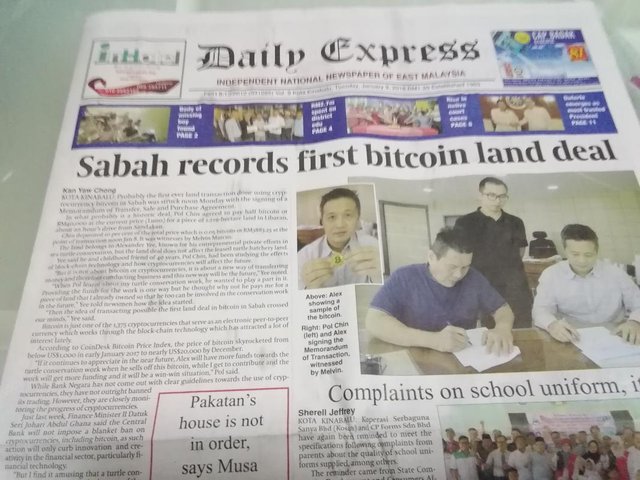First Sale & Purchase of Land in Sabah using Bitcoin?

Here’s the front page (9 Jan 2018) of one of our local english daily. It is a real world example of the misconceptions relating to the crypto currencies.
On the face of it, it’s presented as a property transaction done in the crypto currency Bitcoin; the purchaser paid 0.5 Bitcoin for a 1.219 hectare of land. It was mentioned that a Sales and Purchase agreement (S&P) was done and the Memorandum of Transfer also (for registering the change of ownership and the price of the transaction at our government's authority The Lands & Survey Department).
But the details seemed to indicate it was actually purchased at Malaysian ringgit RM40,000. I would presume that figure of RM40,000 (rather than just 0.5 Bitcoin) was also used in the S&P and the Memorandum of Transfer. This is because things like any stamp duty on the transfer and any Real Property Gains Tax (RPGT on the seller) needed a RM value to compute.
Due to the legal laws and regulations we currently live under, the new alternative coins are in transition and are misunderstood.
In that example transaction, you could have substituted USD (or any currency apart from our RM) instead of bitcoin. If say the land was sold for USD10,000, which is about RM40,000. All the issues mentioned under the Bitcoin scenario, relating to the S&P, Memorandum and RPGT, still apply. So why would we want to have used Bitcoin in the transaction?
Is it because some say (as in the newspaper report above) Bitcoin can go higher, perhaps to USD100,000 or even USD1 million? Then Bitcoin just becomes an “investment” meant to generate profit or gain in a present fiat currency. No different from a person currently buying, say the Yuan, with his home currency to make trading profit from arbitrage.
Is it because Bitcoin will take over when the current global financial system (fiat money, central banks with QE printing, governments and corporates and individuals over-borrowed and credit overused, bankers creating more and more debt such as student loans and credit cards and car loans) can no longer be sustainable? What is forgotten is that all the related centralised government controlled rules and regulations (such as property titles in the example above) have to be replaced with “trustless” versions running on the distributed ledger kept on the blockchain. No more “government” of the current centralised bureaucracy? Don’t forget that one reason for the current centralised and controlled system is for governments to raise tax revenue.
Is it because Bitcoin cannot be controlled by the governments and central bankers? Is this really true at the present time? If the purchaser and seller in the example above were just transferring 0.5 Bitcoin between 2 individuals, then the public and private keys make the transfer anonymous and be perfectly recorded in the blockchain's distributed ledger technology. But doing a transaction involving a real tangible asset that requires official governmental approval and recording with an official document like a land title to be issued will defeat the whole Bitcoin premise as anonymous and not subject to the control of the authorities.
Bitcoin (in essence the distributed ledger technology) cannot be looked at in isolation, it can only be fully utilised when all related processes are running on similar “trustless” systems.
The distributed ledger technology must also mean open ledgers, ie copies of the updated ledgers are everywhere on the net. Coins like Ripple are private distributed ledgers kept only in the participating banks. So whenever we hear of a new coin linked to the current fiat system players, eg the rumoured ACChain SDR coin or the Fedcoin, we need to ask if they run on limited participants private distributed ledgers?
Bitcoin may not even be the ultimately the “winner” in the final conclusion in the future. New variants will always be invented, explored and tried out to handle the inefficiencies identified in current coins. As an example, Hashgraph is held up as a new variant that can avoid the need for the blockchain to rely on the miners as processing nodes. Perhaps this can be implemented when mining is no longer “economically viable”. I’m no expert, but Hashgraph seems to rely on everyone on the net to process the distributed ledger as gossip. So no one needs to be paid as such for maintaining the finalised copy of the ledger at the end of each round.
I stand to be corrected and would be more than happy to learn more from those more knowledgeable on these issues to ease the confusion i'm in.
Congratulations @shsiehsabah! You received a personal award!
You can view your badges on your Steem Board and compare to others on the Steem Ranking
Do not miss the last post from @steemitboard:
Vote for @Steemitboard as a witness to get one more award and increased upvotes!